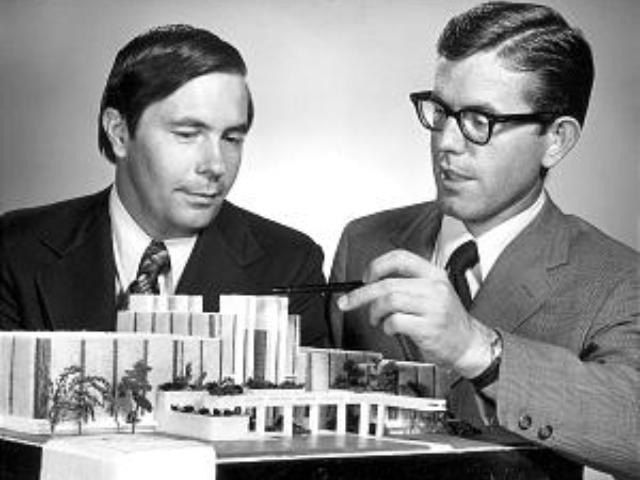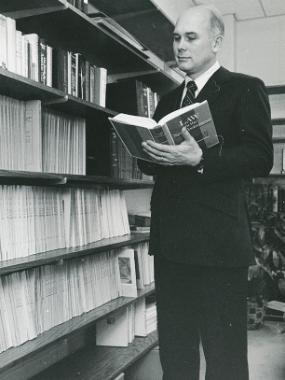| Temple Square is always beautiful in the springtime. Gardeners work to prepare the ground for General Conference. © 2012 Intellectual Reserve, Inc. All rights reserved. | 1 / 2 |
This story appears here courtesy of TheChurchNews.com. It is not for use by other media.
By Jason Swensen, Church News
President Dallin H. Oaks’ recently published biography captures a “groundbreaking” moment that both personifies the vibrant Church leader and jurist — and also the very structure that he was helping to build.
It was May 1, 1973, and then-Brigham Young University (BYU) President Oaks — now First Counselor in the First Presidency — was participating in the ceremonial groundbreaking for what would become the university’s J. Reuben Clark Law School.
President Oaks joined Elder Ezra Taft Benson of the Quorum of the Twelve Apostles and law school Dean Rex E. Lee atop a front-end loader and, with Lee at the controls, began breaking asphalt. Moments later, the men grabbed shovels for a more traditional groundbreaking.
As the biography notes, Dean Lee plunged his spade deep into the soil, prompting President Oaks to retort: “Don’t stop, Rex, keep going till the building is finished.”
For nearly a half-century, such enthusiasm and clarity has defined the BYU Law School, even as it evolves to meet the challenges and opportunities of the day.
Fifty years ago, President Harold B. Lee announced plans to build a law school at the Church’s Provo, Utah, university. Two years later, the J. Reuben Clark Law School welcomed its first class of future attorneys. Since then, thousands of graduates have left distinctive marks on the global legal community and beyond.
The look of the BYU Law School itself has changed since the early 1970s. That first graduating class included few women. Now female students form a sizable block of the class of 2021 — and women are filling key leadership and faculty positions.
The Church News recently spoke about the law school’s storied past and its ongoing commitment to train a new generation of attorneys with Law School Dean D. Gordon Smith, Dean of Communications Lynnett Rands and External Relations Dean Michael Middleton.

Law-School-2.jpeg
In a photo from 1971, J. Reuben Clark Law School Dean Rex E. Lee (left) and BYU administrator Bruce Hafen inspect model of the school. Photo courtesy of BYU, courtesy of Church News.All rights reserved.(Parts of the interview have been edited for clarity and length.)
How has the BYU Law School become an essential element of the Church’s flagship university and its guiding injunction “Enter to Learn; Go Forth to Serve”?
Dean Smith: We are preparing for a golden jubilee celebration in the fall of 2023. As part of that preparation, we wanted to get a sense for what it was like in those early days and what people were anticipating from the law school.
We’ve met several people who were sitting in that devotional in 1971 where President Harold B. Lee announced the law school and either knew then, or subsequently made the decision, to attend BYU Law School.
It would have been a challenging thing to decide to throw your lot in with a brand new law school that wasn’t accredited and didn’t have a building or even a full faculty. But the one thing we heard over and over again is that they trusted that if BYU and the Church were doing it, it was going to be great.
President Oaks charged that initial faculty, class and staff to make the law school great.
Our mission as a law school has to be congruent with the mission of our sponsoring institution. It’s a worldwide mission. It’s not just a parochial, limited, regional scope. We’re looking at law from a global perspective.
We send our students throughout the United States. We have programs in Washington, D.C., New York City and the Silicon Valley. Next year, we’re launching programs in London [England] and Geneva [Switzerland]. We have a vibrant master’s program in law for people who have already done a law degree outside the United States. And we attract students from Brazil, Mexico, China and Africa.
Dean Rands: Dean Smith has become a thought leader in legal law and leadership, and he’s often on the circuit speaking about our program at the BYU Law School.
In this complex world we are in, innovation is required. We are known for innovation and leadership at BYU Law. We send our graduates out with that mindset of leadership so that they are agents of change and influence globally, not just in the Intermountain West.

Law-School-3.jpg
Dr. Dallin H. Oaks at the J. Reuben Clark Law Building. Photo courtesy of Deseret News Archives, courtesy of Church News.All rights reserved.How is the charge of teaching the laws of men in light of the laws of God being fulfilled in the lives and lawyering of your BYU Law students and graduates?
Dean Smith: Most law schools are committed to teaching legal analysis and the power of reason. We teach our students to combine intellect with faith in making decisions and analyzing situations.
It’s a hallmark of a BYU legal education that we emphasize that sort of faith perspective, as well as reason.
I think if we’re motivated only by reason, it’s pretty easy to go astray. But if we add faith to it, then we’ll have a North Star that we can follow.
To me, the gospel is about the inherent dignity and equality of each individual. We’re motivated by a desire to help our students understand that the reason we are doing what we are doing is to help people and to serve. That’s what the legal profession is — it’s a service profession.
We are motivated by the knowledge that every person we encounter is a child of God. Our role is to serve him or her in the best way we can.
Dean Middleton: Many of the Savior’s prophetic and self-titled titles are part of the legal profession: Counselor. Mediator. Advocate. Lawgiver. Judge.
There are countless ways that we are trying, with a full-building approach, to point our students to the Savior and say: “You can be like Him. You can learn from Him, and your very actions — as an attorney, as a family member, as a community citizen — can be informed and guided by the Savior.”
Dean Rands: The mindset that we have about who is our neighbor and the inherent dignity of each person, as well as the combination of our faith and intellect, is what makes BYU Law special and our influence powerful.
This year’s graduating class will surely follow a wide range of career paths — but do you have a common aspiration for each and every grad?
Dean Smith: One of the things my predecessor, Elder James Rasband [now a General Authority Seventy], was fond of saying was that a law degree is a leadership degree.
We’ve adopted that as a bit of a mantra. Law is a leadership degree. It doesn’t matter what field you go into; you’ll have opportunities to lead.
We have thought about the various ways that we might want our graduates to lead. We want them to advance justice. We want them to advance mercy, liberty, opportunity, peace and the rule of law.

Law-School-4.jpeg
Historical photo from the early 1970s of construction of Brigham Young University’s J. Reuben Clark School of Law. Photo courtesy of BYU Photo, courtesy of Church News.All rights reserved.These are values that the law school community shares.
I’m hoping that our graduates can be the sort of people who help us advance, as a society, to pursue our most cherished values. And when there are conflicts, they can help us find a way through it.
I think lawyers are extremely well positioned to do that. We teach people how to think through conflict resolution in ways that are productive. Also, I think that lawyers understand human behavior in ways that help us take steps to move a community forward.
Dean Rands: BYU Law is a rigorous program where excellence is expected — not just of our students, but also of the faculty, administration and staff.
So when graduates come out of the program, they have excellent skills, and they expect that of those around them. With that leadership mindset, they are also people of integrity. That makes a huge difference in whatever community they find themselves in.
Dean Middleton: Our students are acquiring excellent skills, hands-on training and the very best legal education we can provide.
Our faculty members and administrators are hoping those students leave with a compass that helps them make decisions in the future.
So many of those early students came because of promptings of the Holy Ghost. … We hope those promptings not only lead today’s students to the law school, but also lead them particularly after they leave the law school.
Copyright 2021 Deseret News Publishing Company
